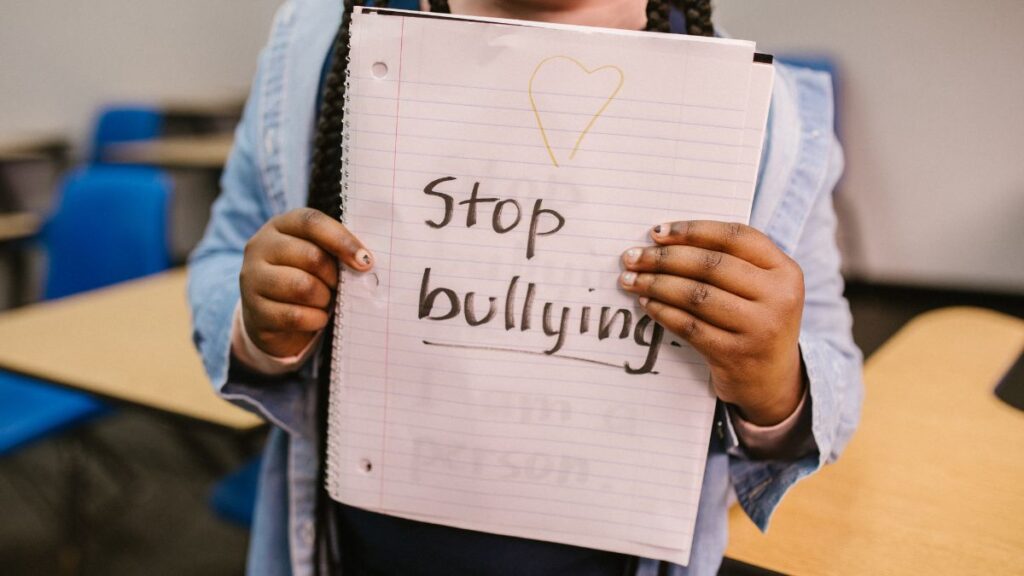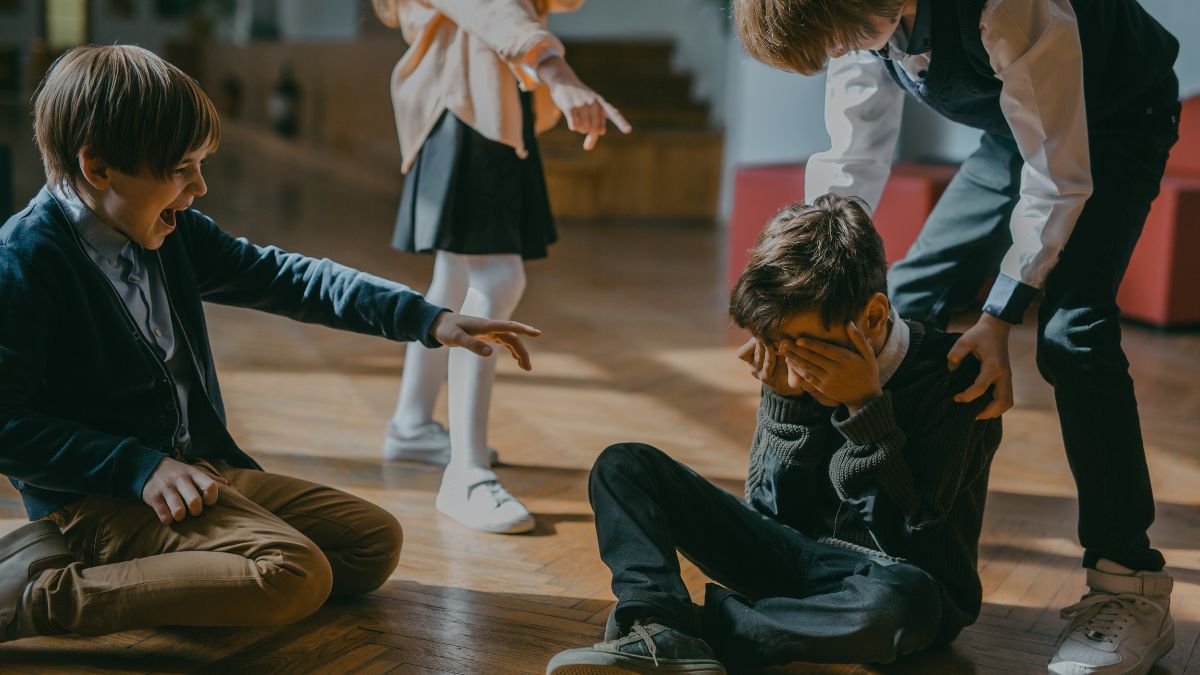All About Bullying: Effects On Children And How To Prevent It
We have all experienced bullying in our lives in one form or another, whether as a child or as an adult. Sometimes at our schools, and other times in the safety of our own homes. Sometimes we have been the victim, and at other unfortunate times, the bully. Regardless of the age, place, or extent of bullying experienced, one thing is for sure; bullying is highly detrimental to a child’s psychological health and can have lasting repercussions, including lifelong fear and social anxiety.
Often parents fail to recognize that their child might be suffering at the hands of bullies, especially if the signs are subtle enough to be ignored. So how do we as caretakers and educators recognize that our child might be experiencing bullying? What practical strategies can we employ to mitigate the adverse outcomes of it and prevent them in the future? Let’s dive right into the topic.
Understanding Bullying & Its Effects On Children

Before exploring more about bullying, it is crucial to define it appropriately. According to the American Psychological Association, bullying is “a form of aggressive behavior in which someone intentionally and repeatedly causes another person injury or discomfort. Bullying can take the form of physical contact, words, or more subtle actions.” The two significant keywords in the given definition are ‘intentionally,’ thus suggesting the act is done on purpose, and ‘repeatedly,’ indicating recurrences of the behavior.
Bullying is prevalent in schools, whether it is primary or secondary schools. High schools are perhaps one of the most prominent places where teenagers are frequently subjected to different forms of bullying. Health practitioners report that children also experience varying degrees of bullying in their homes, usually by an older or more dominant family member, including siblings and parents. Additionally, with easy access to technology in the last two decades, cyberbullying has increased immensely, with cyberbullies verbally harassing or threatening others online, especially young children.
Bullying can be highly traumatic for the victim and their loved ones, depending on the intensity and frequency of the acts. A child’s mental health and social skills can take a severe hit. Children or even adults who are victims of bullying tend to be more anxious, with lower self-esteem and confidence, and are also likely to avoid social interactions. Center for Disease Control indicates that bullying “increases the risk for depression, anxiety, sleep difficulties, lower academic achievement, and dropping out of school.”
On the other hand, children who grow up bullying others are more likely to become aggressive adults in the future, with a higher inclination towards violence, crime, and drug abuse.
How Does Bullying Start?
Anyone can become a bully at any age. Children usually pick up abusive behavior like intimidation tactics from their households by observing their family members. In incidents where a family member uses insults or threats as a way to control others, the children acquire or learn this behavior to assert dominance over their classmates to counter the hurt they feel at home.
Bullying is also highly linked to insecurity and negligence. Many children and teenagers use bullying for popularity; they insult and expose others to feel better about themselves and seek attention or validation from peers. Making rumors and spreading gossip about others to put others down is often a common tactic.
School bullies and abusive family members also use intimidation or physical violence to coerce others to do as they want, for example, do their chores/homework for them, and take away others’ belongings, including toys or money. The primary purpose is to instill fear in the victim’s minds for personal benefit.
How To Identify Bullying
Parents can often tell if their child is getting bullied, especially when he or she shows signs of physical or mental trauma. However, the symptoms are sometimes subtle and can most likely go unnoticed, no matter how observant the parents are. Due to communication gaps and lack of trust, it is usually not easy for kids to open up to their parents if they suffer. Similarly, students may feel embarrassed or fearful of the bully when reporting such behaviors to teachers or school authorities. So how do we identify if a child is being bullied? Look out for the following signs:
- Sudden antisocial, aggressive, or skittish behavior
- Changes in appetite
- Lowering academic performance
- Unexplained injuries
- Lost or broken belongings like gadgets, clothes, toys, etc.
- Recurring anxiety attacks or aches
- Anything that seems out of character
It is also essential to notice if your child is developing bullying characteristics. Here are some signs to look out for:
- Unexplained money, toys, and other things
- Aggressive behavior, i.e., fighting or verbally abusing
- Not taking responsibility for their actions
- Lying and blaming others or any form of manipulation
- Having friends that are bullies
Effective Strategies To Counter Bullying

Since schools are known for being the playground for bullying, the school staff should be extra cautious about reinforcing good behavior and look out for any signs of bullying or harassment. A recent Greater Good article suggests that “students consistently report that teachers miss most incidents of bullying and fail to help students when asked. A majority of teachers report that they feel unprepared to deal with classroom bullying. Some teachers bully students themselves, or show a lack of empathy toward children who are bullied.” An improved screening process while hiring teachers and mandatory training to handle bullying might be beneficial for detecting and minimizing bullying at schools. Having experienced student counselors as well as psychologists at the high schools and college level may also be an effective approach as many students face mental health issues due to constantly being subjected to bullying.
Children primarily reflect on what they learn at home. Hence, as parents, we are responsible for educating children about bullying from their early years. It is crucial to make them understand that they should not transgress other people’s boundaries or disrespect them, nor let others violate their boundaries or mistreat them. Thus, a positive home environment is essential to the child’s learning, leading to increased self-worth and confidence. Working towards teaching tolerance, and creating healthy and communicative relationships will likely promote trust and let the children know they can count on their parents. Elders and other family members should strictly refrain from fighting or arguing in front of the children as they are highly impressionable and easily traumatized.
If your child is being repeatedly bullied at school, it is necessary first to encourage them to take a stand and to speak to a teacher or the administration first. If the bullying is persistent, it might be advisable to approach school authorities or involve the offender’s parents. Additionally, a trained therapist might also help your child mitigate the situation and learn coping mechanisms to reduce the psychological repercussions.
- How to Raise Awesome Parents: A Guide by the World’s Coolest 5-Year-Old - December 22, 2023
- How to Use Sight Words: Strategies for Mastering Common Words - August 4, 2023
- Understanding Dyslexia: Nurturing the Unique Reading Journey of Dyslexic Readers - July 31, 2023







